Report: Theories and Frameworks in Teaching Disabled Learners
VerifiedAdded on 2023/01/10
|15
|5478
|1
Report
AI Summary
This report delves into the complexities of teaching disabled learners, exploring various theories and frameworks that inform effective instructional practices. It begins with a literature review examining the importance of research in developing learning opportunities, the influence of learning theories (behaviorist, cognitive, and social constructivism), and the impact of the social model of disability on inclusive learning. The review also defines inclusive learning, highlights its importance for disabled learners, and addresses organizational challenges. Furthermore, the report analyzes how attitudes toward disability, including cultural, social, and faith-based perspectives, affect learning opportunities. The second part of the report presents a report on the influence of national, regional, and local policies on provision for disabled learners, the impact of risk assessments on curriculum design, and the role of legal requirements and guidance in promoting learner well-being. It also examines the roles of support organizations, strategies for maintaining relationships with stakeholders, the skills required for collaborative work, and the impact of policy frameworks on local initiatives. Finally, a reflective account is provided, analyzing how theory and research inform the author's own practice and the impact of their attitudes on professional practices, providing valuable insights into the application of the theoretical concepts discussed. The report concludes with a synthesis of the key findings and recommendations for enhancing the educational experience of disabled learners.
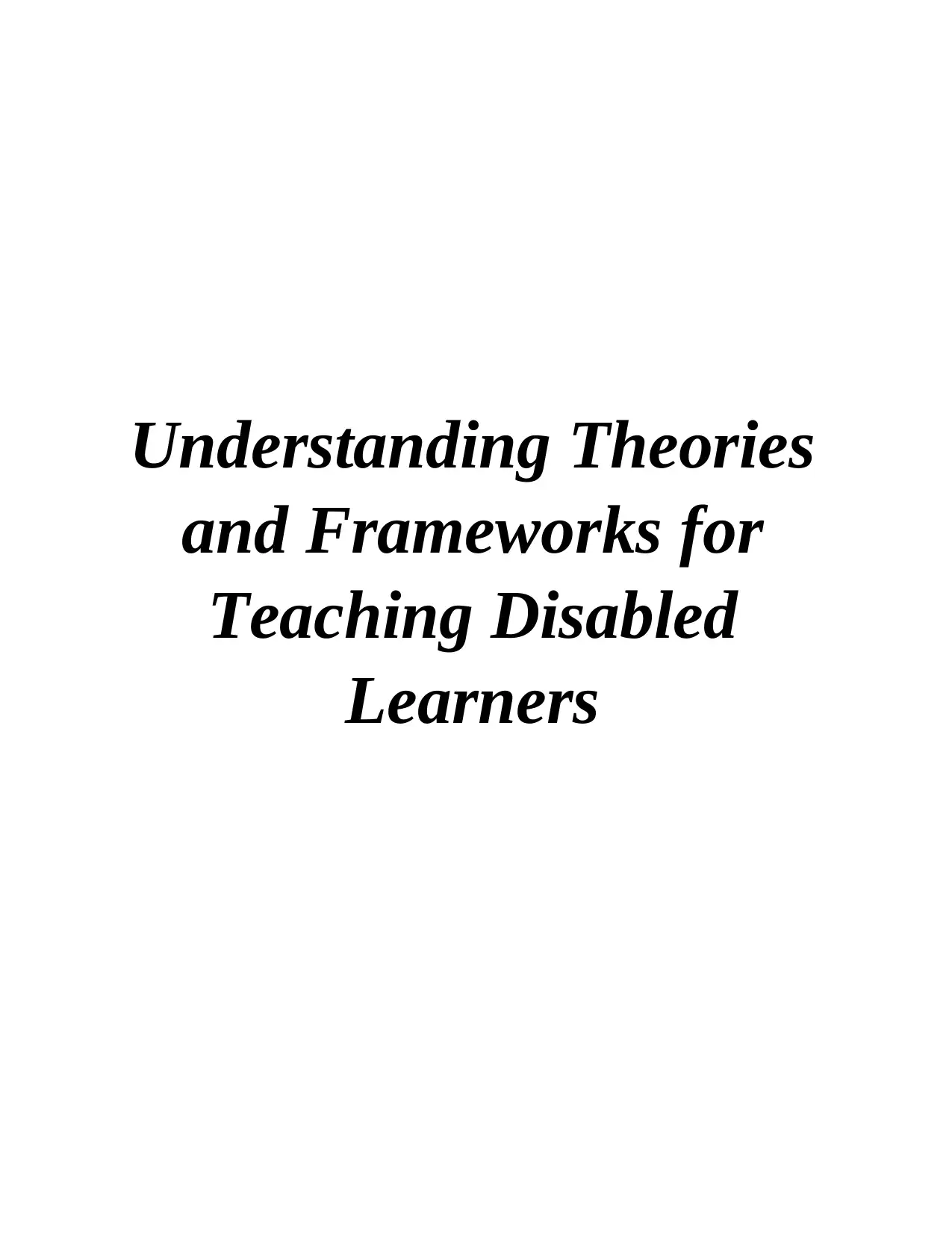
Understanding Theories
and Frameworks for
Teaching Disabled
Learners
and Frameworks for
Teaching Disabled
Learners
Paraphrase This Document
Need a fresh take? Get an instant paraphrase of this document with our AI Paraphraser
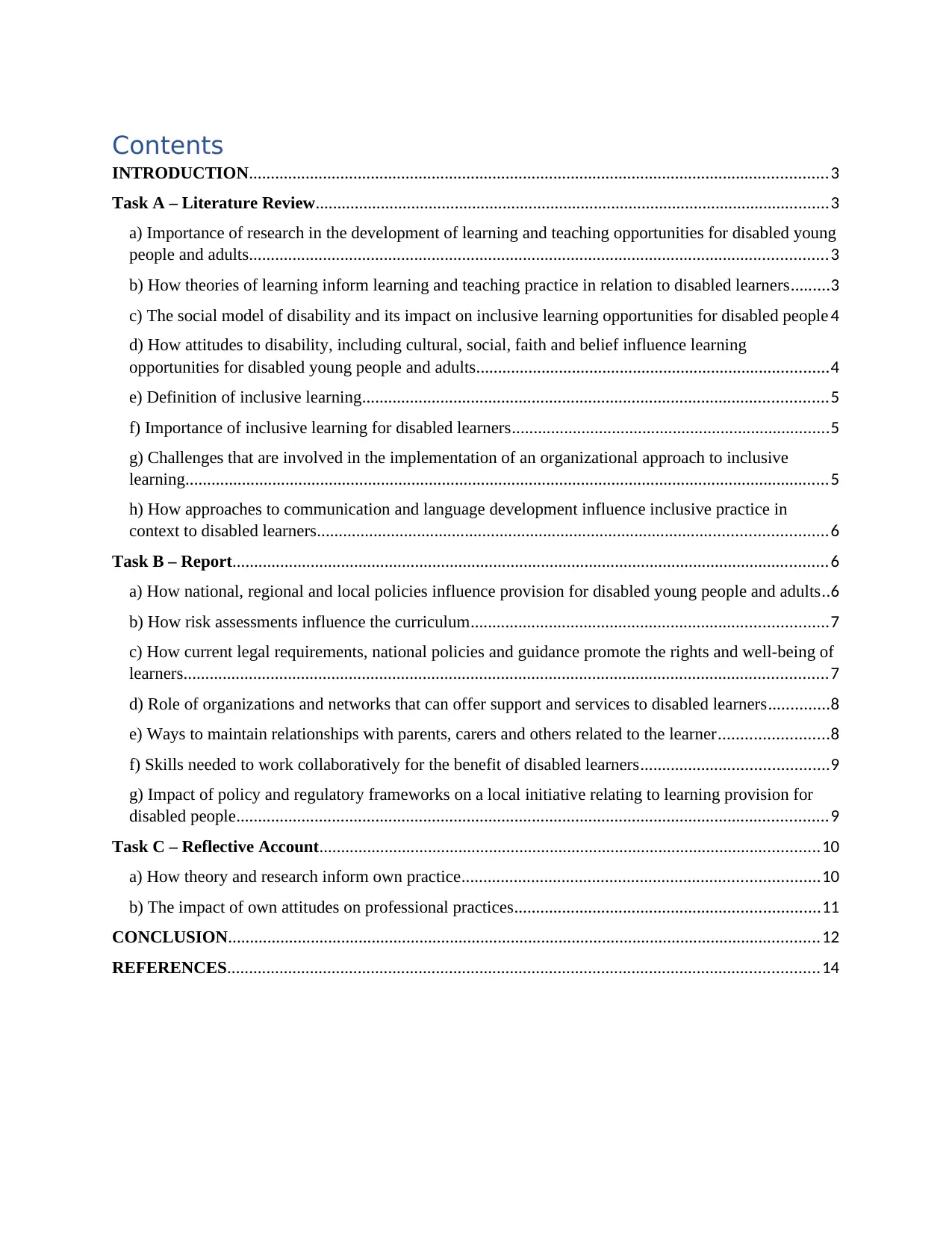
Contents
INTRODUCTION.....................................................................................................................................3
Task A – Literature Review......................................................................................................................3
a) Importance of research in the development of learning and teaching opportunities for disabled young
people and adults.....................................................................................................................................3
b) How theories of learning inform learning and teaching practice in relation to disabled learners.........3
c) The social model of disability and its impact on inclusive learning opportunities for disabled people 4
d) How attitudes to disability, including cultural, social, faith and belief influence learning
opportunities for disabled young people and adults.................................................................................4
e) Definition of inclusive learning...........................................................................................................5
f) Importance of inclusive learning for disabled learners.........................................................................5
g) Challenges that are involved in the implementation of an organizational approach to inclusive
learning....................................................................................................................................................5
h) How approaches to communication and language development influence inclusive practice in
context to disabled learners.....................................................................................................................6
Task B – Report.........................................................................................................................................6
a) How national, regional and local policies influence provision for disabled young people and adults..6
b) How risk assessments influence the curriculum..................................................................................7
c) How current legal requirements, national policies and guidance promote the rights and well-being of
learners....................................................................................................................................................7
d) Role of organizations and networks that can offer support and services to disabled learners..............8
e) Ways to maintain relationships with parents, carers and others related to the learner.........................8
f) Skills needed to work collaboratively for the benefit of disabled learners...........................................9
g) Impact of policy and regulatory frameworks on a local initiative relating to learning provision for
disabled people........................................................................................................................................9
Task C – Reflective Account...................................................................................................................10
a) How theory and research inform own practice..................................................................................10
b) The impact of own attitudes on professional practices......................................................................11
CONCLUSION........................................................................................................................................12
REFERENCES........................................................................................................................................14
INTRODUCTION.....................................................................................................................................3
Task A – Literature Review......................................................................................................................3
a) Importance of research in the development of learning and teaching opportunities for disabled young
people and adults.....................................................................................................................................3
b) How theories of learning inform learning and teaching practice in relation to disabled learners.........3
c) The social model of disability and its impact on inclusive learning opportunities for disabled people 4
d) How attitudes to disability, including cultural, social, faith and belief influence learning
opportunities for disabled young people and adults.................................................................................4
e) Definition of inclusive learning...........................................................................................................5
f) Importance of inclusive learning for disabled learners.........................................................................5
g) Challenges that are involved in the implementation of an organizational approach to inclusive
learning....................................................................................................................................................5
h) How approaches to communication and language development influence inclusive practice in
context to disabled learners.....................................................................................................................6
Task B – Report.........................................................................................................................................6
a) How national, regional and local policies influence provision for disabled young people and adults..6
b) How risk assessments influence the curriculum..................................................................................7
c) How current legal requirements, national policies and guidance promote the rights and well-being of
learners....................................................................................................................................................7
d) Role of organizations and networks that can offer support and services to disabled learners..............8
e) Ways to maintain relationships with parents, carers and others related to the learner.........................8
f) Skills needed to work collaboratively for the benefit of disabled learners...........................................9
g) Impact of policy and regulatory frameworks on a local initiative relating to learning provision for
disabled people........................................................................................................................................9
Task C – Reflective Account...................................................................................................................10
a) How theory and research inform own practice..................................................................................10
b) The impact of own attitudes on professional practices......................................................................11
CONCLUSION........................................................................................................................................12
REFERENCES........................................................................................................................................14
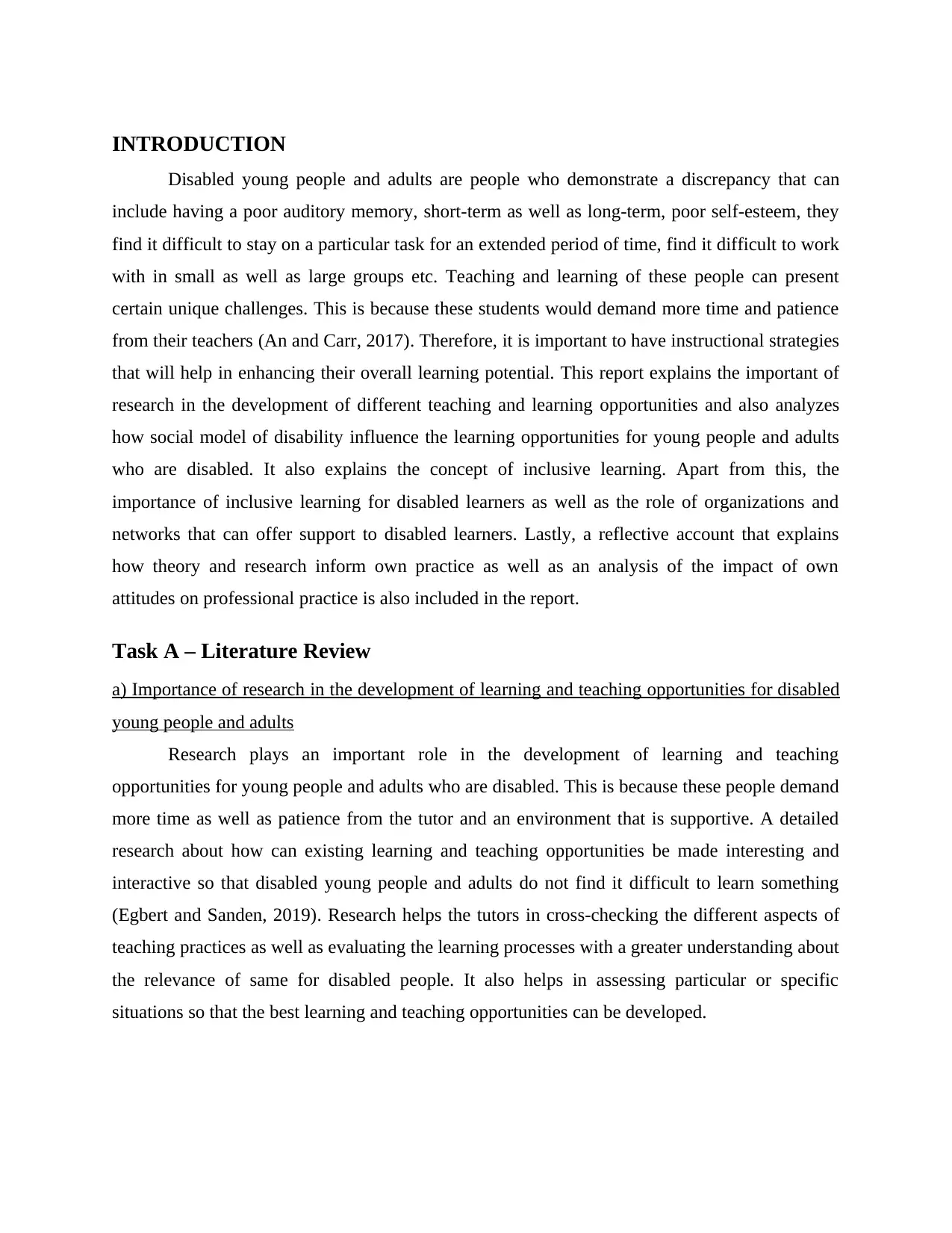
INTRODUCTION
Disabled young people and adults are people who demonstrate a discrepancy that can
include having a poor auditory memory, short-term as well as long-term, poor self-esteem, they
find it difficult to stay on a particular task for an extended period of time, find it difficult to work
with in small as well as large groups etc. Teaching and learning of these people can present
certain unique challenges. This is because these students would demand more time and patience
from their teachers (An and Carr, 2017). Therefore, it is important to have instructional strategies
that will help in enhancing their overall learning potential. This report explains the important of
research in the development of different teaching and learning opportunities and also analyzes
how social model of disability influence the learning opportunities for young people and adults
who are disabled. It also explains the concept of inclusive learning. Apart from this, the
importance of inclusive learning for disabled learners as well as the role of organizations and
networks that can offer support to disabled learners. Lastly, a reflective account that explains
how theory and research inform own practice as well as an analysis of the impact of own
attitudes on professional practice is also included in the report.
Task A – Literature Review
a) Importance of research in the development of learning and teaching opportunities for disabled
young people and adults
Research plays an important role in the development of learning and teaching
opportunities for young people and adults who are disabled. This is because these people demand
more time as well as patience from the tutor and an environment that is supportive. A detailed
research about how can existing learning and teaching opportunities be made interesting and
interactive so that disabled young people and adults do not find it difficult to learn something
(Egbert and Sanden, 2019). Research helps the tutors in cross-checking the different aspects of
teaching practices as well as evaluating the learning processes with a greater understanding about
the relevance of same for disabled people. It also helps in assessing particular or specific
situations so that the best learning and teaching opportunities can be developed.
Disabled young people and adults are people who demonstrate a discrepancy that can
include having a poor auditory memory, short-term as well as long-term, poor self-esteem, they
find it difficult to stay on a particular task for an extended period of time, find it difficult to work
with in small as well as large groups etc. Teaching and learning of these people can present
certain unique challenges. This is because these students would demand more time and patience
from their teachers (An and Carr, 2017). Therefore, it is important to have instructional strategies
that will help in enhancing their overall learning potential. This report explains the important of
research in the development of different teaching and learning opportunities and also analyzes
how social model of disability influence the learning opportunities for young people and adults
who are disabled. It also explains the concept of inclusive learning. Apart from this, the
importance of inclusive learning for disabled learners as well as the role of organizations and
networks that can offer support to disabled learners. Lastly, a reflective account that explains
how theory and research inform own practice as well as an analysis of the impact of own
attitudes on professional practice is also included in the report.
Task A – Literature Review
a) Importance of research in the development of learning and teaching opportunities for disabled
young people and adults
Research plays an important role in the development of learning and teaching
opportunities for young people and adults who are disabled. This is because these people demand
more time as well as patience from the tutor and an environment that is supportive. A detailed
research about how can existing learning and teaching opportunities be made interesting and
interactive so that disabled young people and adults do not find it difficult to learn something
(Egbert and Sanden, 2019). Research helps the tutors in cross-checking the different aspects of
teaching practices as well as evaluating the learning processes with a greater understanding about
the relevance of same for disabled people. It also helps in assessing particular or specific
situations so that the best learning and teaching opportunities can be developed.
⊘ This is a preview!⊘
Do you want full access?
Subscribe today to unlock all pages.

Trusted by 1+ million students worldwide
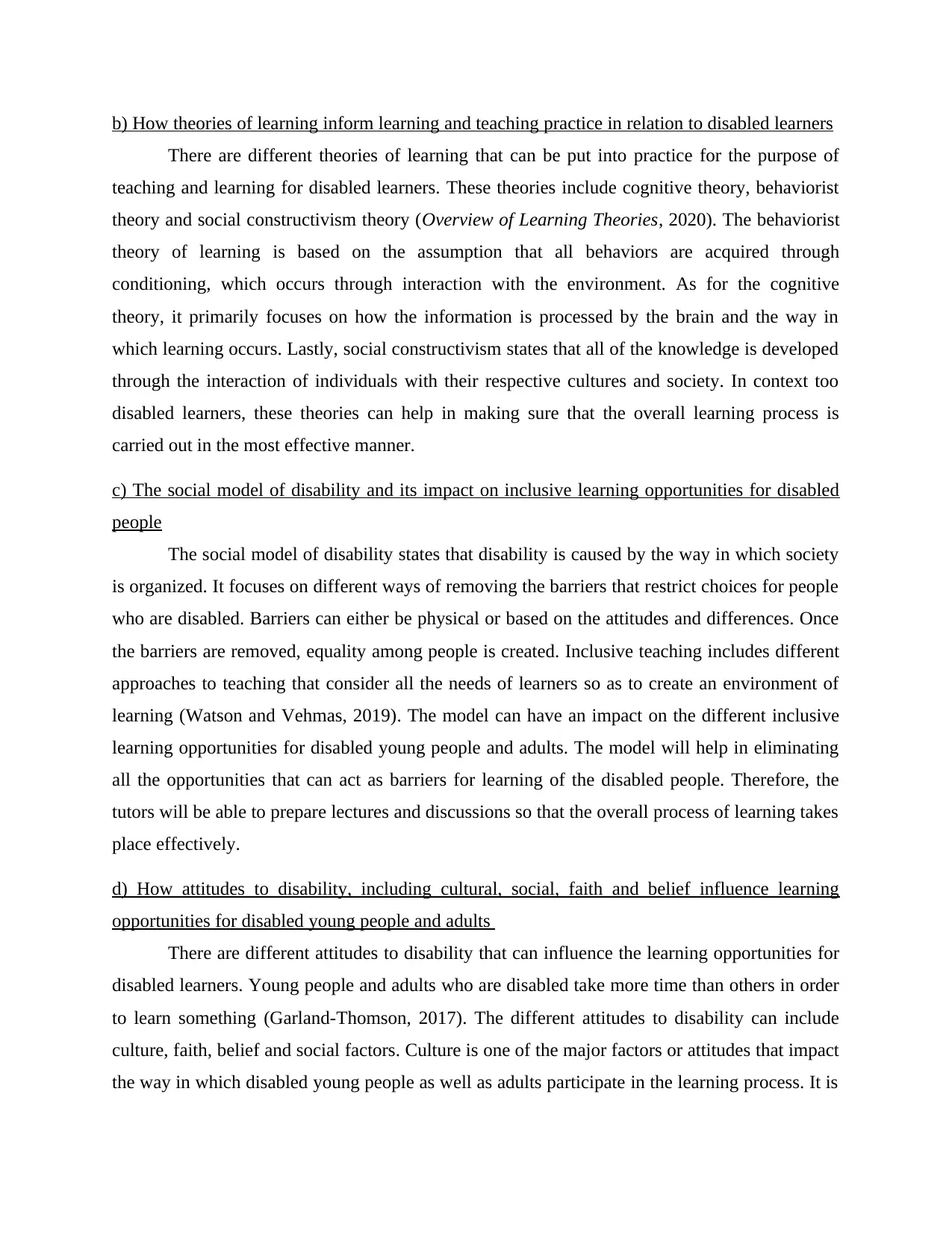
b) How theories of learning inform learning and teaching practice in relation to disabled learners
There are different theories of learning that can be put into practice for the purpose of
teaching and learning for disabled learners. These theories include cognitive theory, behaviorist
theory and social constructivism theory (Overview of Learning Theories, 2020). The behaviorist
theory of learning is based on the assumption that all behaviors are acquired through
conditioning, which occurs through interaction with the environment. As for the cognitive
theory, it primarily focuses on how the information is processed by the brain and the way in
which learning occurs. Lastly, social constructivism states that all of the knowledge is developed
through the interaction of individuals with their respective cultures and society. In context too
disabled learners, these theories can help in making sure that the overall learning process is
carried out in the most effective manner.
c) The social model of disability and its impact on inclusive learning opportunities for disabled
people
The social model of disability states that disability is caused by the way in which society
is organized. It focuses on different ways of removing the barriers that restrict choices for people
who are disabled. Barriers can either be physical or based on the attitudes and differences. Once
the barriers are removed, equality among people is created. Inclusive teaching includes different
approaches to teaching that consider all the needs of learners so as to create an environment of
learning (Watson and Vehmas, 2019). The model can have an impact on the different inclusive
learning opportunities for disabled young people and adults. The model will help in eliminating
all the opportunities that can act as barriers for learning of the disabled people. Therefore, the
tutors will be able to prepare lectures and discussions so that the overall process of learning takes
place effectively.
d) How attitudes to disability, including cultural, social, faith and belief influence learning
opportunities for disabled young people and adults
There are different attitudes to disability that can influence the learning opportunities for
disabled learners. Young people and adults who are disabled take more time than others in order
to learn something (Garland-Thomson, 2017). The different attitudes to disability can include
culture, faith, belief and social factors. Culture is one of the major factors or attitudes that impact
the way in which disabled young people as well as adults participate in the learning process. It is
There are different theories of learning that can be put into practice for the purpose of
teaching and learning for disabled learners. These theories include cognitive theory, behaviorist
theory and social constructivism theory (Overview of Learning Theories, 2020). The behaviorist
theory of learning is based on the assumption that all behaviors are acquired through
conditioning, which occurs through interaction with the environment. As for the cognitive
theory, it primarily focuses on how the information is processed by the brain and the way in
which learning occurs. Lastly, social constructivism states that all of the knowledge is developed
through the interaction of individuals with their respective cultures and society. In context too
disabled learners, these theories can help in making sure that the overall learning process is
carried out in the most effective manner.
c) The social model of disability and its impact on inclusive learning opportunities for disabled
people
The social model of disability states that disability is caused by the way in which society
is organized. It focuses on different ways of removing the barriers that restrict choices for people
who are disabled. Barriers can either be physical or based on the attitudes and differences. Once
the barriers are removed, equality among people is created. Inclusive teaching includes different
approaches to teaching that consider all the needs of learners so as to create an environment of
learning (Watson and Vehmas, 2019). The model can have an impact on the different inclusive
learning opportunities for disabled young people and adults. The model will help in eliminating
all the opportunities that can act as barriers for learning of the disabled people. Therefore, the
tutors will be able to prepare lectures and discussions so that the overall process of learning takes
place effectively.
d) How attitudes to disability, including cultural, social, faith and belief influence learning
opportunities for disabled young people and adults
There are different attitudes to disability that can influence the learning opportunities for
disabled learners. Young people and adults who are disabled take more time than others in order
to learn something (Garland-Thomson, 2017). The different attitudes to disability can include
culture, faith, belief and social factors. Culture is one of the major factors or attitudes that impact
the way in which disabled young people as well as adults participate in the learning process. It is
Paraphrase This Document
Need a fresh take? Get an instant paraphrase of this document with our AI Paraphraser

important for the tutor to have a detailed understanding of the individual academic learning
abilities as well as cultural backgrounds of learners. Young people often find their learning
experiences to be negative which can affect their social relationships with others. Therefore, it is
important to build a social environment that is positive and promotes effective learning of the
disabled people. Similarly, belief and faith can also influence the way in which learning
opportunities are perceived by disabled young people and adults.
e) Definition of inclusive learning
Inclusive learning recognizes the needs and requirements of all learners and respects
diversity among them. It also encourages the participation of learners and removes barriers
(What is inclusive learning and teaching and why is it important?, 2020). Apart from this, it also
provides a learning environment that is welcoming to all learners and thus adapts to their special
needs in an effective way. Inclusive learning is important because it encourages the participation
of both parents as well as the learners in the different learning activities. This helps in creating a
cultural environment wherein there is mutual respect among the learners. Inclusive learning
makes sure that needs as well as preferences of the disabled young people and adults are met.
Lastly, an inclusive learning environment respects the diversity of learners.
f) Importance of inclusive learning for disabled learners
Inclusive learning is about creating an environment wherein lessons and programs are
designed in such a way that all learners can participate and learn mutually. It also focuses on
finding different means so that friendships and mutual respect is developed not only among the
learners, but with the tutor as well. Inclusive learning is important for young people and adults
with disabilities because it helps in creating a sense of belonging, having friendships and
relationships with others (Griful-Freixenet and et. al., 2017). This helps in enhancing their levels
of self-esteem and confidence. Also, a positive environment is created wherein there is an
understanding as well as acceptance of diversity. Apart from this, inclusive learning also helps in
creating better learning opportunities for people with disabilities. This is because disabled people
are often motivated when they are surrounded by other people within the classroom.
abilities as well as cultural backgrounds of learners. Young people often find their learning
experiences to be negative which can affect their social relationships with others. Therefore, it is
important to build a social environment that is positive and promotes effective learning of the
disabled people. Similarly, belief and faith can also influence the way in which learning
opportunities are perceived by disabled young people and adults.
e) Definition of inclusive learning
Inclusive learning recognizes the needs and requirements of all learners and respects
diversity among them. It also encourages the participation of learners and removes barriers
(What is inclusive learning and teaching and why is it important?, 2020). Apart from this, it also
provides a learning environment that is welcoming to all learners and thus adapts to their special
needs in an effective way. Inclusive learning is important because it encourages the participation
of both parents as well as the learners in the different learning activities. This helps in creating a
cultural environment wherein there is mutual respect among the learners. Inclusive learning
makes sure that needs as well as preferences of the disabled young people and adults are met.
Lastly, an inclusive learning environment respects the diversity of learners.
f) Importance of inclusive learning for disabled learners
Inclusive learning is about creating an environment wherein lessons and programs are
designed in such a way that all learners can participate and learn mutually. It also focuses on
finding different means so that friendships and mutual respect is developed not only among the
learners, but with the tutor as well. Inclusive learning is important for young people and adults
with disabilities because it helps in creating a sense of belonging, having friendships and
relationships with others (Griful-Freixenet and et. al., 2017). This helps in enhancing their levels
of self-esteem and confidence. Also, a positive environment is created wherein there is an
understanding as well as acceptance of diversity. Apart from this, inclusive learning also helps in
creating better learning opportunities for people with disabilities. This is because disabled people
are often motivated when they are surrounded by other people within the classroom.
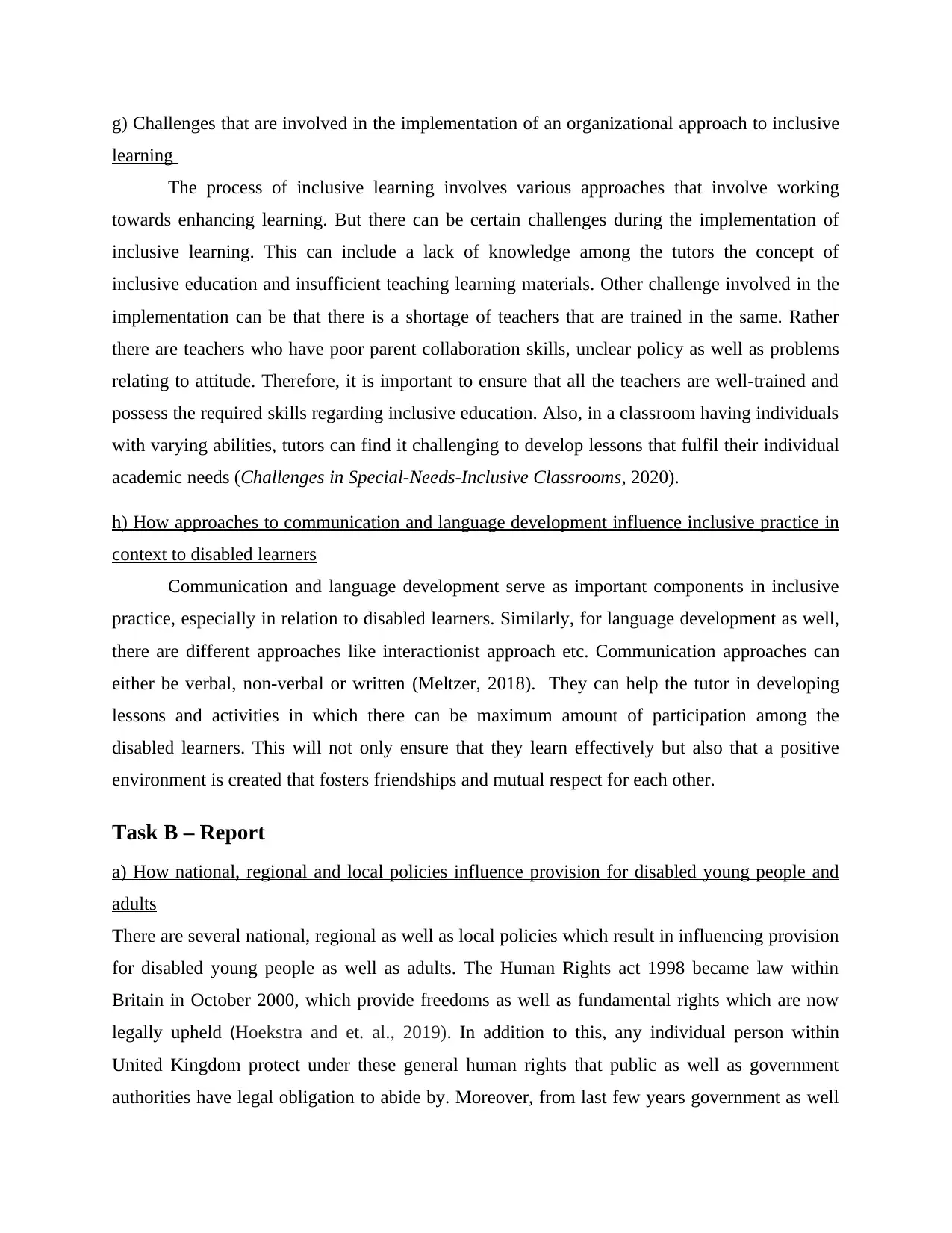
g) Challenges that are involved in the implementation of an organizational approach to inclusive
learning
The process of inclusive learning involves various approaches that involve working
towards enhancing learning. But there can be certain challenges during the implementation of
inclusive learning. This can include a lack of knowledge among the tutors the concept of
inclusive education and insufficient teaching learning materials. Other challenge involved in the
implementation can be that there is a shortage of teachers that are trained in the same. Rather
there are teachers who have poor parent collaboration skills, unclear policy as well as problems
relating to attitude. Therefore, it is important to ensure that all the teachers are well-trained and
possess the required skills regarding inclusive education. Also, in a classroom having individuals
with varying abilities, tutors can find it challenging to develop lessons that fulfil their individual
academic needs (Challenges in Special-Needs-Inclusive Classrooms, 2020).
h) How approaches to communication and language development influence inclusive practice in
context to disabled learners
Communication and language development serve as important components in inclusive
practice, especially in relation to disabled learners. Similarly, for language development as well,
there are different approaches like interactionist approach etc. Communication approaches can
either be verbal, non-verbal or written (Meltzer, 2018). They can help the tutor in developing
lessons and activities in which there can be maximum amount of participation among the
disabled learners. This will not only ensure that they learn effectively but also that a positive
environment is created that fosters friendships and mutual respect for each other.
Task B – Report
a) How national, regional and local policies influence provision for disabled young people and
adults
There are several national, regional as well as local policies which result in influencing provision
for disabled young people as well as adults. The Human Rights act 1998 became law within
Britain in October 2000, which provide freedoms as well as fundamental rights which are now
legally upheld (Hoekstra and et. al., 2019). In addition to this, any individual person within
United Kingdom protect under these general human rights that public as well as government
authorities have legal obligation to abide by. Moreover, from last few years government as well
learning
The process of inclusive learning involves various approaches that involve working
towards enhancing learning. But there can be certain challenges during the implementation of
inclusive learning. This can include a lack of knowledge among the tutors the concept of
inclusive education and insufficient teaching learning materials. Other challenge involved in the
implementation can be that there is a shortage of teachers that are trained in the same. Rather
there are teachers who have poor parent collaboration skills, unclear policy as well as problems
relating to attitude. Therefore, it is important to ensure that all the teachers are well-trained and
possess the required skills regarding inclusive education. Also, in a classroom having individuals
with varying abilities, tutors can find it challenging to develop lessons that fulfil their individual
academic needs (Challenges in Special-Needs-Inclusive Classrooms, 2020).
h) How approaches to communication and language development influence inclusive practice in
context to disabled learners
Communication and language development serve as important components in inclusive
practice, especially in relation to disabled learners. Similarly, for language development as well,
there are different approaches like interactionist approach etc. Communication approaches can
either be verbal, non-verbal or written (Meltzer, 2018). They can help the tutor in developing
lessons and activities in which there can be maximum amount of participation among the
disabled learners. This will not only ensure that they learn effectively but also that a positive
environment is created that fosters friendships and mutual respect for each other.
Task B – Report
a) How national, regional and local policies influence provision for disabled young people and
adults
There are several national, regional as well as local policies which result in influencing provision
for disabled young people as well as adults. The Human Rights act 1998 became law within
Britain in October 2000, which provide freedoms as well as fundamental rights which are now
legally upheld (Hoekstra and et. al., 2019). In addition to this, any individual person within
United Kingdom protect under these general human rights that public as well as government
authorities have legal obligation to abide by. Moreover, from last few years government as well
⊘ This is a preview!⊘
Do you want full access?
Subscribe today to unlock all pages.

Trusted by 1+ million students worldwide
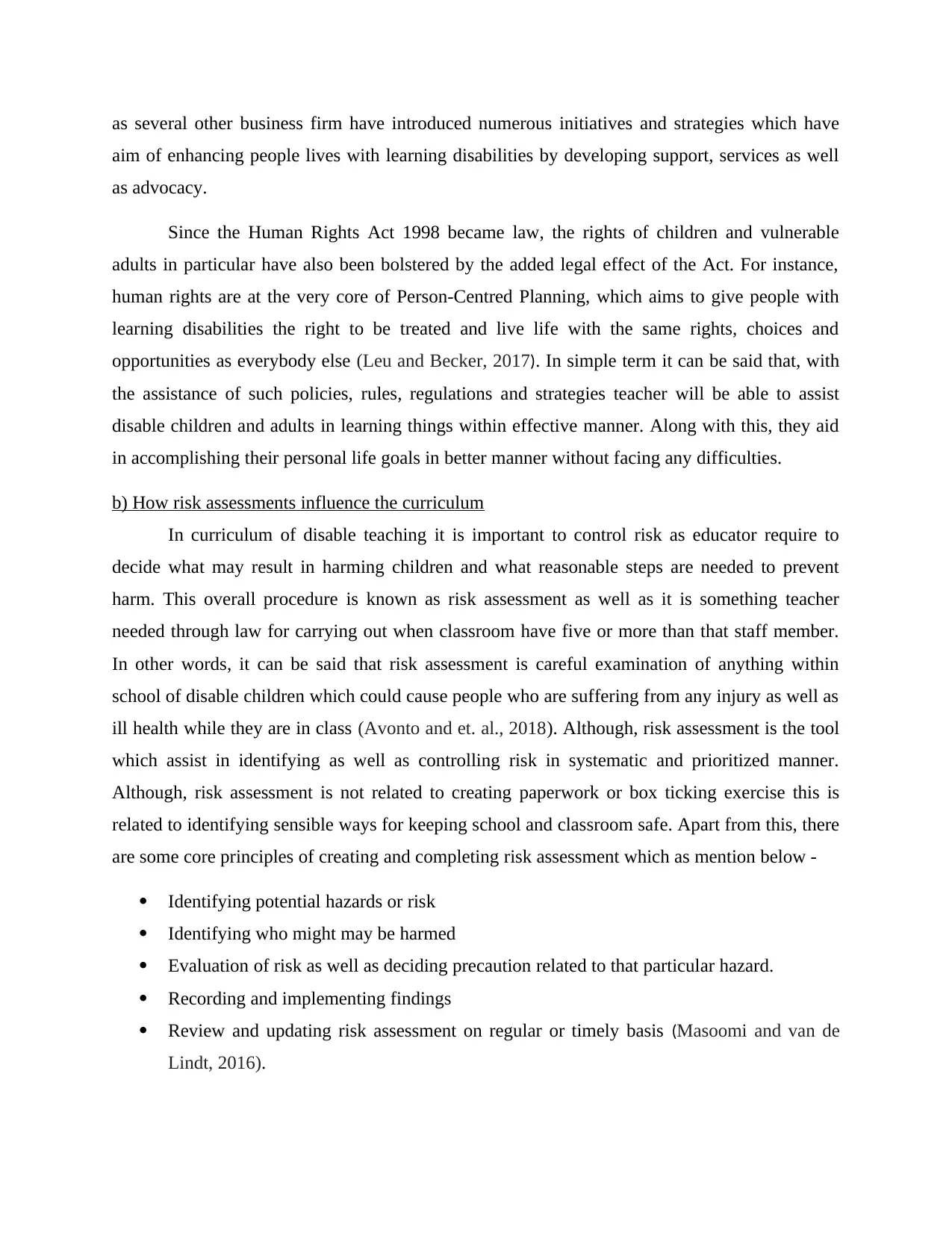
as several other business firm have introduced numerous initiatives and strategies which have
aim of enhancing people lives with learning disabilities by developing support, services as well
as advocacy.
Since the Human Rights Act 1998 became law, the rights of children and vulnerable
adults in particular have also been bolstered by the added legal effect of the Act. For instance,
human rights are at the very core of Person-Centred Planning, which aims to give people with
learning disabilities the right to be treated and live life with the same rights, choices and
opportunities as everybody else (Leu and Becker, 2017). In simple term it can be said that, with
the assistance of such policies, rules, regulations and strategies teacher will be able to assist
disable children and adults in learning things within effective manner. Along with this, they aid
in accomplishing their personal life goals in better manner without facing any difficulties.
b) How risk assessments influence the curriculum
In curriculum of disable teaching it is important to control risk as educator require to
decide what may result in harming children and what reasonable steps are needed to prevent
harm. This overall procedure is known as risk assessment as well as it is something teacher
needed through law for carrying out when classroom have five or more than that staff member.
In other words, it can be said that risk assessment is careful examination of anything within
school of disable children which could cause people who are suffering from any injury as well as
ill health while they are in class (Avonto and et. al., 2018). Although, risk assessment is the tool
which assist in identifying as well as controlling risk in systematic and prioritized manner.
Although, risk assessment is not related to creating paperwork or box ticking exercise this is
related to identifying sensible ways for keeping school and classroom safe. Apart from this, there
are some core principles of creating and completing risk assessment which as mention below -
Identifying potential hazards or risk
Identifying who might may be harmed
Evaluation of risk as well as deciding precaution related to that particular hazard.
Recording and implementing findings
Review and updating risk assessment on regular or timely basis (Masoomi and van de
Lindt, 2016).
aim of enhancing people lives with learning disabilities by developing support, services as well
as advocacy.
Since the Human Rights Act 1998 became law, the rights of children and vulnerable
adults in particular have also been bolstered by the added legal effect of the Act. For instance,
human rights are at the very core of Person-Centred Planning, which aims to give people with
learning disabilities the right to be treated and live life with the same rights, choices and
opportunities as everybody else (Leu and Becker, 2017). In simple term it can be said that, with
the assistance of such policies, rules, regulations and strategies teacher will be able to assist
disable children and adults in learning things within effective manner. Along with this, they aid
in accomplishing their personal life goals in better manner without facing any difficulties.
b) How risk assessments influence the curriculum
In curriculum of disable teaching it is important to control risk as educator require to
decide what may result in harming children and what reasonable steps are needed to prevent
harm. This overall procedure is known as risk assessment as well as it is something teacher
needed through law for carrying out when classroom have five or more than that staff member.
In other words, it can be said that risk assessment is careful examination of anything within
school of disable children which could cause people who are suffering from any injury as well as
ill health while they are in class (Avonto and et. al., 2018). Although, risk assessment is the tool
which assist in identifying as well as controlling risk in systematic and prioritized manner.
Although, risk assessment is not related to creating paperwork or box ticking exercise this is
related to identifying sensible ways for keeping school and classroom safe. Apart from this, there
are some core principles of creating and completing risk assessment which as mention below -
Identifying potential hazards or risk
Identifying who might may be harmed
Evaluation of risk as well as deciding precaution related to that particular hazard.
Recording and implementing findings
Review and updating risk assessment on regular or timely basis (Masoomi and van de
Lindt, 2016).
Paraphrase This Document
Need a fresh take? Get an instant paraphrase of this document with our AI Paraphraser
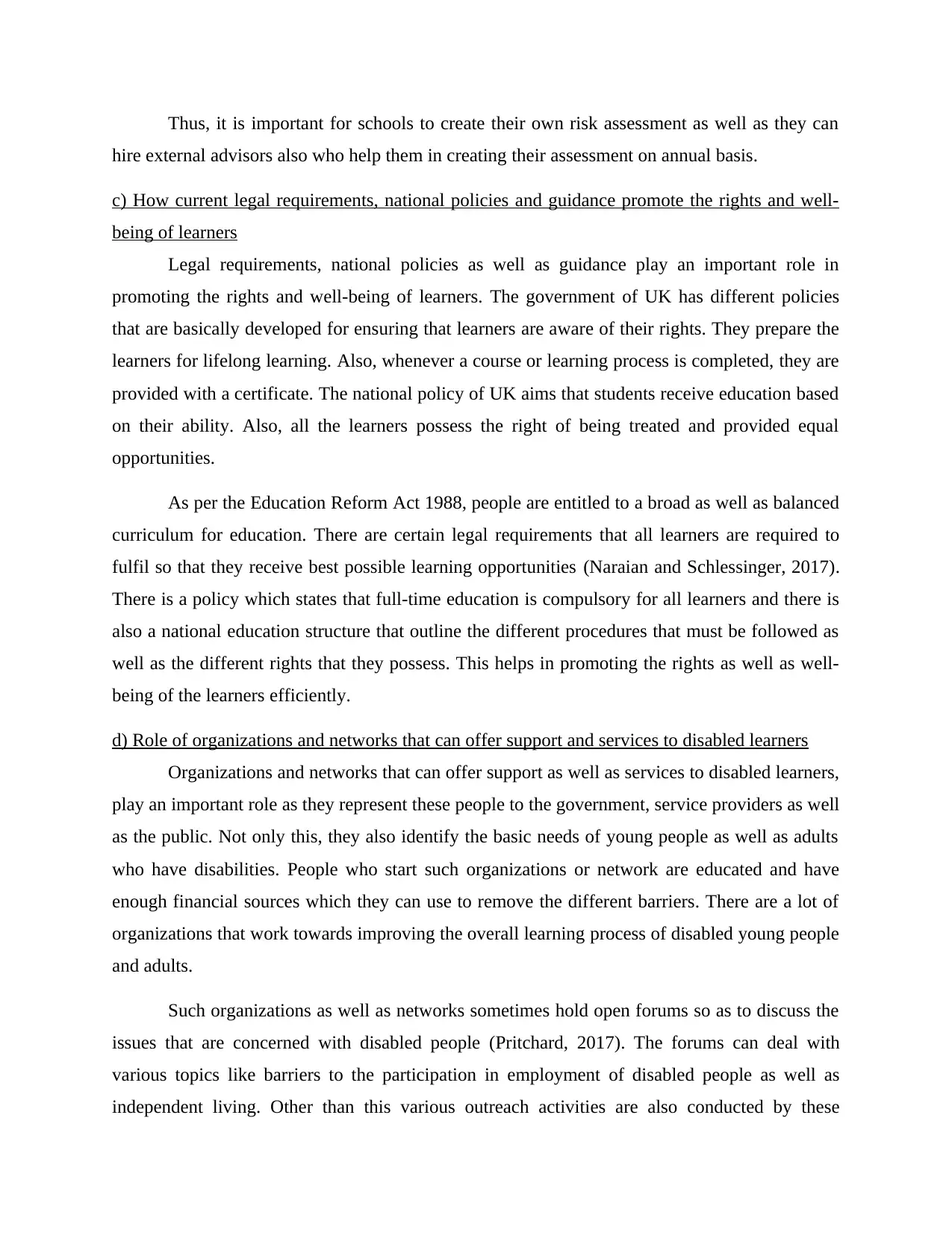
Thus, it is important for schools to create their own risk assessment as well as they can
hire external advisors also who help them in creating their assessment on annual basis.
c) How current legal requirements, national policies and guidance promote the rights and well-
being of learners
Legal requirements, national policies as well as guidance play an important role in
promoting the rights and well-being of learners. The government of UK has different policies
that are basically developed for ensuring that learners are aware of their rights. They prepare the
learners for lifelong learning. Also, whenever a course or learning process is completed, they are
provided with a certificate. The national policy of UK aims that students receive education based
on their ability. Also, all the learners possess the right of being treated and provided equal
opportunities.
As per the Education Reform Act 1988, people are entitled to a broad as well as balanced
curriculum for education. There are certain legal requirements that all learners are required to
fulfil so that they receive best possible learning opportunities (Naraian and Schlessinger, 2017).
There is a policy which states that full-time education is compulsory for all learners and there is
also a national education structure that outline the different procedures that must be followed as
well as the different rights that they possess. This helps in promoting the rights as well as well-
being of the learners efficiently.
d) Role of organizations and networks that can offer support and services to disabled learners
Organizations and networks that can offer support as well as services to disabled learners,
play an important role as they represent these people to the government, service providers as well
as the public. Not only this, they also identify the basic needs of young people as well as adults
who have disabilities. People who start such organizations or network are educated and have
enough financial sources which they can use to remove the different barriers. There are a lot of
organizations that work towards improving the overall learning process of disabled young people
and adults.
Such organizations as well as networks sometimes hold open forums so as to discuss the
issues that are concerned with disabled people (Pritchard, 2017). The forums can deal with
various topics like barriers to the participation in employment of disabled people as well as
independent living. Other than this various outreach activities are also conducted by these
hire external advisors also who help them in creating their assessment on annual basis.
c) How current legal requirements, national policies and guidance promote the rights and well-
being of learners
Legal requirements, national policies as well as guidance play an important role in
promoting the rights and well-being of learners. The government of UK has different policies
that are basically developed for ensuring that learners are aware of their rights. They prepare the
learners for lifelong learning. Also, whenever a course or learning process is completed, they are
provided with a certificate. The national policy of UK aims that students receive education based
on their ability. Also, all the learners possess the right of being treated and provided equal
opportunities.
As per the Education Reform Act 1988, people are entitled to a broad as well as balanced
curriculum for education. There are certain legal requirements that all learners are required to
fulfil so that they receive best possible learning opportunities (Naraian and Schlessinger, 2017).
There is a policy which states that full-time education is compulsory for all learners and there is
also a national education structure that outline the different procedures that must be followed as
well as the different rights that they possess. This helps in promoting the rights as well as well-
being of the learners efficiently.
d) Role of organizations and networks that can offer support and services to disabled learners
Organizations and networks that can offer support as well as services to disabled learners,
play an important role as they represent these people to the government, service providers as well
as the public. Not only this, they also identify the basic needs of young people as well as adults
who have disabilities. People who start such organizations or network are educated and have
enough financial sources which they can use to remove the different barriers. There are a lot of
organizations that work towards improving the overall learning process of disabled young people
and adults.
Such organizations as well as networks sometimes hold open forums so as to discuss the
issues that are concerned with disabled people (Pritchard, 2017). The forums can deal with
various topics like barriers to the participation in employment of disabled people as well as
independent living. Other than this various outreach activities are also conducted by these
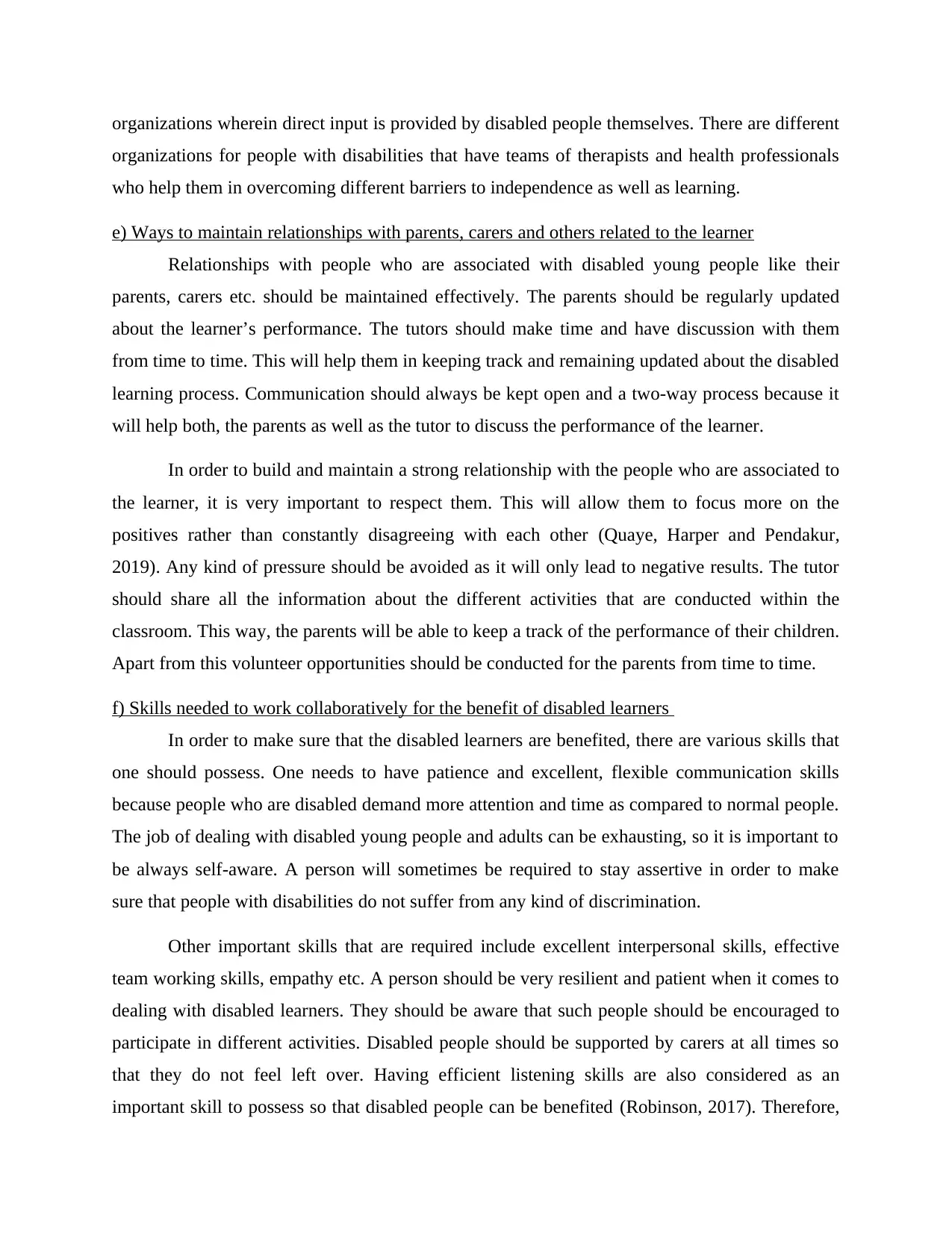
organizations wherein direct input is provided by disabled people themselves. There are different
organizations for people with disabilities that have teams of therapists and health professionals
who help them in overcoming different barriers to independence as well as learning.
e) Ways to maintain relationships with parents, carers and others related to the learner
Relationships with people who are associated with disabled young people like their
parents, carers etc. should be maintained effectively. The parents should be regularly updated
about the learner’s performance. The tutors should make time and have discussion with them
from time to time. This will help them in keeping track and remaining updated about the disabled
learning process. Communication should always be kept open and a two-way process because it
will help both, the parents as well as the tutor to discuss the performance of the learner.
In order to build and maintain a strong relationship with the people who are associated to
the learner, it is very important to respect them. This will allow them to focus more on the
positives rather than constantly disagreeing with each other (Quaye, Harper and Pendakur,
2019). Any kind of pressure should be avoided as it will only lead to negative results. The tutor
should share all the information about the different activities that are conducted within the
classroom. This way, the parents will be able to keep a track of the performance of their children.
Apart from this volunteer opportunities should be conducted for the parents from time to time.
f) Skills needed to work collaboratively for the benefit of disabled learners
In order to make sure that the disabled learners are benefited, there are various skills that
one should possess. One needs to have patience and excellent, flexible communication skills
because people who are disabled demand more attention and time as compared to normal people.
The job of dealing with disabled young people and adults can be exhausting, so it is important to
be always self-aware. A person will sometimes be required to stay assertive in order to make
sure that people with disabilities do not suffer from any kind of discrimination.
Other important skills that are required include excellent interpersonal skills, effective
team working skills, empathy etc. A person should be very resilient and patient when it comes to
dealing with disabled learners. They should be aware that such people should be encouraged to
participate in different activities. Disabled people should be supported by carers at all times so
that they do not feel left over. Having efficient listening skills are also considered as an
important skill to possess so that disabled people can be benefited (Robinson, 2017). Therefore,
organizations for people with disabilities that have teams of therapists and health professionals
who help them in overcoming different barriers to independence as well as learning.
e) Ways to maintain relationships with parents, carers and others related to the learner
Relationships with people who are associated with disabled young people like their
parents, carers etc. should be maintained effectively. The parents should be regularly updated
about the learner’s performance. The tutors should make time and have discussion with them
from time to time. This will help them in keeping track and remaining updated about the disabled
learning process. Communication should always be kept open and a two-way process because it
will help both, the parents as well as the tutor to discuss the performance of the learner.
In order to build and maintain a strong relationship with the people who are associated to
the learner, it is very important to respect them. This will allow them to focus more on the
positives rather than constantly disagreeing with each other (Quaye, Harper and Pendakur,
2019). Any kind of pressure should be avoided as it will only lead to negative results. The tutor
should share all the information about the different activities that are conducted within the
classroom. This way, the parents will be able to keep a track of the performance of their children.
Apart from this volunteer opportunities should be conducted for the parents from time to time.
f) Skills needed to work collaboratively for the benefit of disabled learners
In order to make sure that the disabled learners are benefited, there are various skills that
one should possess. One needs to have patience and excellent, flexible communication skills
because people who are disabled demand more attention and time as compared to normal people.
The job of dealing with disabled young people and adults can be exhausting, so it is important to
be always self-aware. A person will sometimes be required to stay assertive in order to make
sure that people with disabilities do not suffer from any kind of discrimination.
Other important skills that are required include excellent interpersonal skills, effective
team working skills, empathy etc. A person should be very resilient and patient when it comes to
dealing with disabled learners. They should be aware that such people should be encouraged to
participate in different activities. Disabled people should be supported by carers at all times so
that they do not feel left over. Having efficient listening skills are also considered as an
important skill to possess so that disabled people can be benefited (Robinson, 2017). Therefore,
⊘ This is a preview!⊘
Do you want full access?
Subscribe today to unlock all pages.

Trusted by 1+ million students worldwide
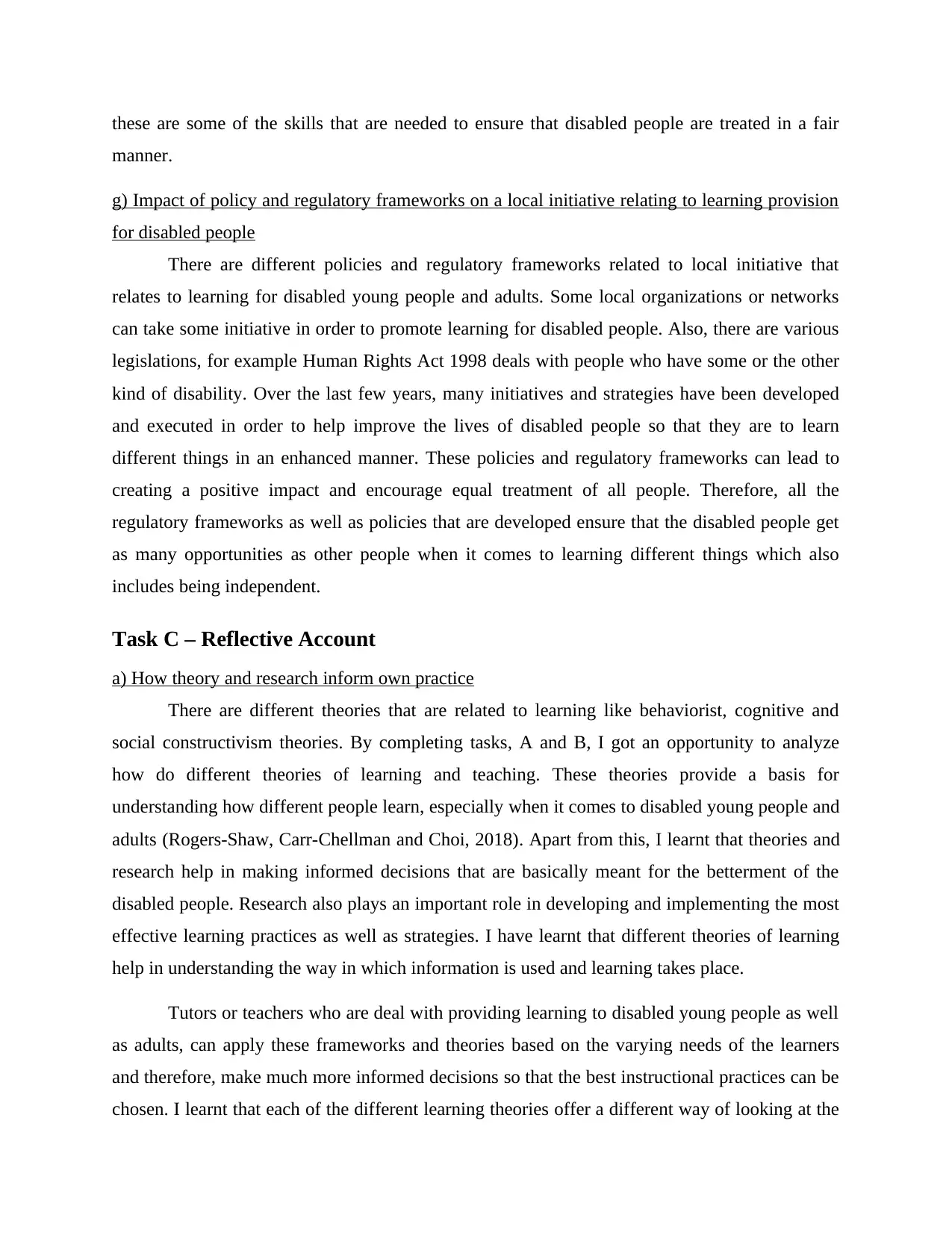
these are some of the skills that are needed to ensure that disabled people are treated in a fair
manner.
g) Impact of policy and regulatory frameworks on a local initiative relating to learning provision
for disabled people
There are different policies and regulatory frameworks related to local initiative that
relates to learning for disabled young people and adults. Some local organizations or networks
can take some initiative in order to promote learning for disabled people. Also, there are various
legislations, for example Human Rights Act 1998 deals with people who have some or the other
kind of disability. Over the last few years, many initiatives and strategies have been developed
and executed in order to help improve the lives of disabled people so that they are to learn
different things in an enhanced manner. These policies and regulatory frameworks can lead to
creating a positive impact and encourage equal treatment of all people. Therefore, all the
regulatory frameworks as well as policies that are developed ensure that the disabled people get
as many opportunities as other people when it comes to learning different things which also
includes being independent.
Task C – Reflective Account
a) How theory and research inform own practice
There are different theories that are related to learning like behaviorist, cognitive and
social constructivism theories. By completing tasks, A and B, I got an opportunity to analyze
how do different theories of learning and teaching. These theories provide a basis for
understanding how different people learn, especially when it comes to disabled young people and
adults (Rogers-Shaw, Carr-Chellman and Choi, 2018). Apart from this, I learnt that theories and
research help in making informed decisions that are basically meant for the betterment of the
disabled people. Research also plays an important role in developing and implementing the most
effective learning practices as well as strategies. I have learnt that different theories of learning
help in understanding the way in which information is used and learning takes place.
Tutors or teachers who are deal with providing learning to disabled young people as well
as adults, can apply these frameworks and theories based on the varying needs of the learners
and therefore, make much more informed decisions so that the best instructional practices can be
chosen. I learnt that each of the different learning theories offer a different way of looking at the
manner.
g) Impact of policy and regulatory frameworks on a local initiative relating to learning provision
for disabled people
There are different policies and regulatory frameworks related to local initiative that
relates to learning for disabled young people and adults. Some local organizations or networks
can take some initiative in order to promote learning for disabled people. Also, there are various
legislations, for example Human Rights Act 1998 deals with people who have some or the other
kind of disability. Over the last few years, many initiatives and strategies have been developed
and executed in order to help improve the lives of disabled people so that they are to learn
different things in an enhanced manner. These policies and regulatory frameworks can lead to
creating a positive impact and encourage equal treatment of all people. Therefore, all the
regulatory frameworks as well as policies that are developed ensure that the disabled people get
as many opportunities as other people when it comes to learning different things which also
includes being independent.
Task C – Reflective Account
a) How theory and research inform own practice
There are different theories that are related to learning like behaviorist, cognitive and
social constructivism theories. By completing tasks, A and B, I got an opportunity to analyze
how do different theories of learning and teaching. These theories provide a basis for
understanding how different people learn, especially when it comes to disabled young people and
adults (Rogers-Shaw, Carr-Chellman and Choi, 2018). Apart from this, I learnt that theories and
research help in making informed decisions that are basically meant for the betterment of the
disabled people. Research also plays an important role in developing and implementing the most
effective learning practices as well as strategies. I have learnt that different theories of learning
help in understanding the way in which information is used and learning takes place.
Tutors or teachers who are deal with providing learning to disabled young people as well
as adults, can apply these frameworks and theories based on the varying needs of the learners
and therefore, make much more informed decisions so that the best instructional practices can be
chosen. I learnt that each of the different learning theories offer a different way of looking at the
Paraphrase This Document
Need a fresh take? Get an instant paraphrase of this document with our AI Paraphraser
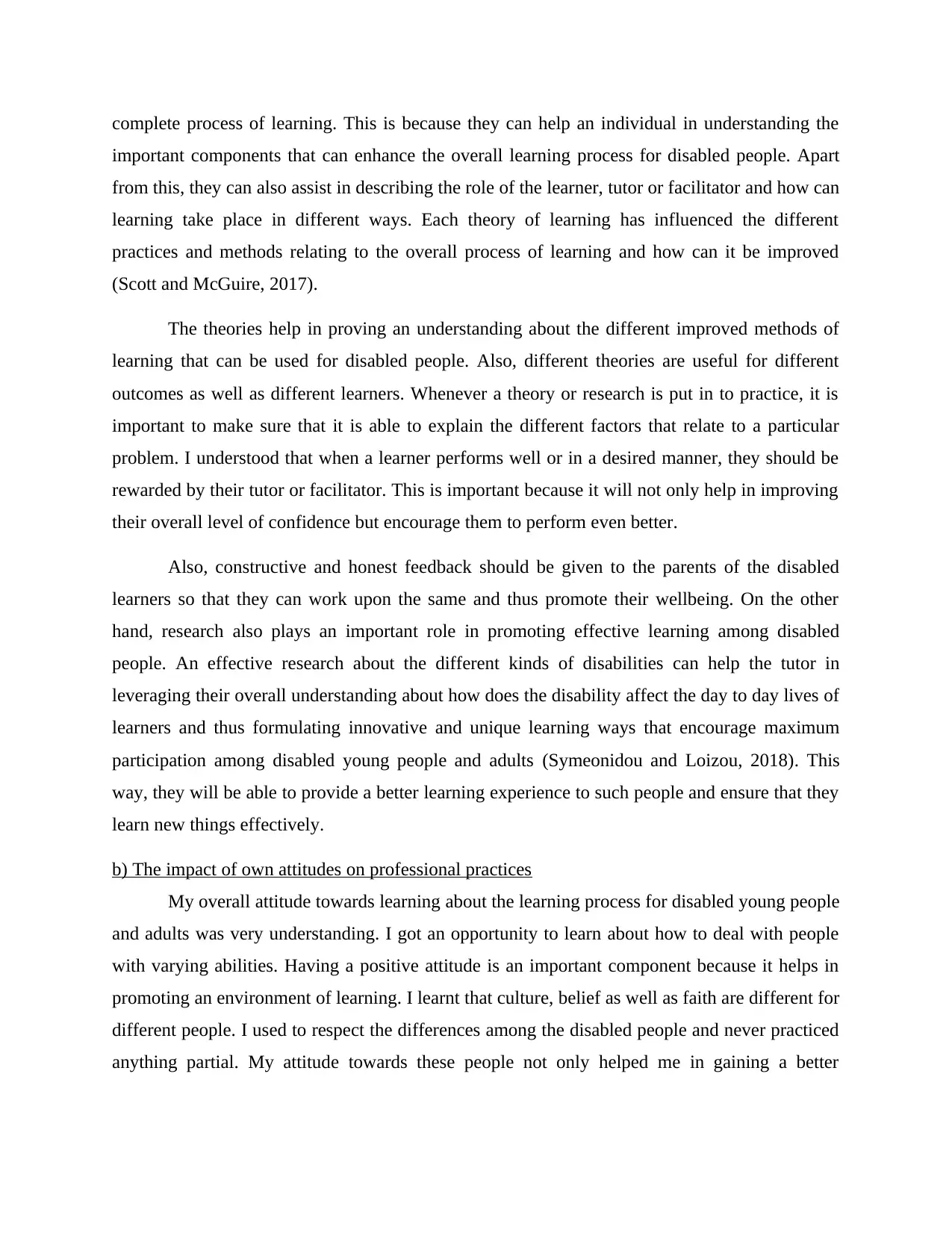
complete process of learning. This is because they can help an individual in understanding the
important components that can enhance the overall learning process for disabled people. Apart
from this, they can also assist in describing the role of the learner, tutor or facilitator and how can
learning take place in different ways. Each theory of learning has influenced the different
practices and methods relating to the overall process of learning and how can it be improved
(Scott and McGuire, 2017).
The theories help in proving an understanding about the different improved methods of
learning that can be used for disabled people. Also, different theories are useful for different
outcomes as well as different learners. Whenever a theory or research is put in to practice, it is
important to make sure that it is able to explain the different factors that relate to a particular
problem. I understood that when a learner performs well or in a desired manner, they should be
rewarded by their tutor or facilitator. This is important because it will not only help in improving
their overall level of confidence but encourage them to perform even better.
Also, constructive and honest feedback should be given to the parents of the disabled
learners so that they can work upon the same and thus promote their wellbeing. On the other
hand, research also plays an important role in promoting effective learning among disabled
people. An effective research about the different kinds of disabilities can help the tutor in
leveraging their overall understanding about how does the disability affect the day to day lives of
learners and thus formulating innovative and unique learning ways that encourage maximum
participation among disabled young people and adults (Symeonidou and Loizou, 2018). This
way, they will be able to provide a better learning experience to such people and ensure that they
learn new things effectively.
b) The impact of own attitudes on professional practices
My overall attitude towards learning about the learning process for disabled young people
and adults was very understanding. I got an opportunity to learn about how to deal with people
with varying abilities. Having a positive attitude is an important component because it helps in
promoting an environment of learning. I learnt that culture, belief as well as faith are different for
different people. I used to respect the differences among the disabled people and never practiced
anything partial. My attitude towards these people not only helped me in gaining a better
important components that can enhance the overall learning process for disabled people. Apart
from this, they can also assist in describing the role of the learner, tutor or facilitator and how can
learning take place in different ways. Each theory of learning has influenced the different
practices and methods relating to the overall process of learning and how can it be improved
(Scott and McGuire, 2017).
The theories help in proving an understanding about the different improved methods of
learning that can be used for disabled people. Also, different theories are useful for different
outcomes as well as different learners. Whenever a theory or research is put in to practice, it is
important to make sure that it is able to explain the different factors that relate to a particular
problem. I understood that when a learner performs well or in a desired manner, they should be
rewarded by their tutor or facilitator. This is important because it will not only help in improving
their overall level of confidence but encourage them to perform even better.
Also, constructive and honest feedback should be given to the parents of the disabled
learners so that they can work upon the same and thus promote their wellbeing. On the other
hand, research also plays an important role in promoting effective learning among disabled
people. An effective research about the different kinds of disabilities can help the tutor in
leveraging their overall understanding about how does the disability affect the day to day lives of
learners and thus formulating innovative and unique learning ways that encourage maximum
participation among disabled young people and adults (Symeonidou and Loizou, 2018). This
way, they will be able to provide a better learning experience to such people and ensure that they
learn new things effectively.
b) The impact of own attitudes on professional practices
My overall attitude towards learning about the learning process for disabled young people
and adults was very understanding. I got an opportunity to learn about how to deal with people
with varying abilities. Having a positive attitude is an important component because it helps in
promoting an environment of learning. I learnt that culture, belief as well as faith are different for
different people. I used to respect the differences among the disabled people and never practiced
anything partial. My attitude towards these people not only helped me in gaining a better
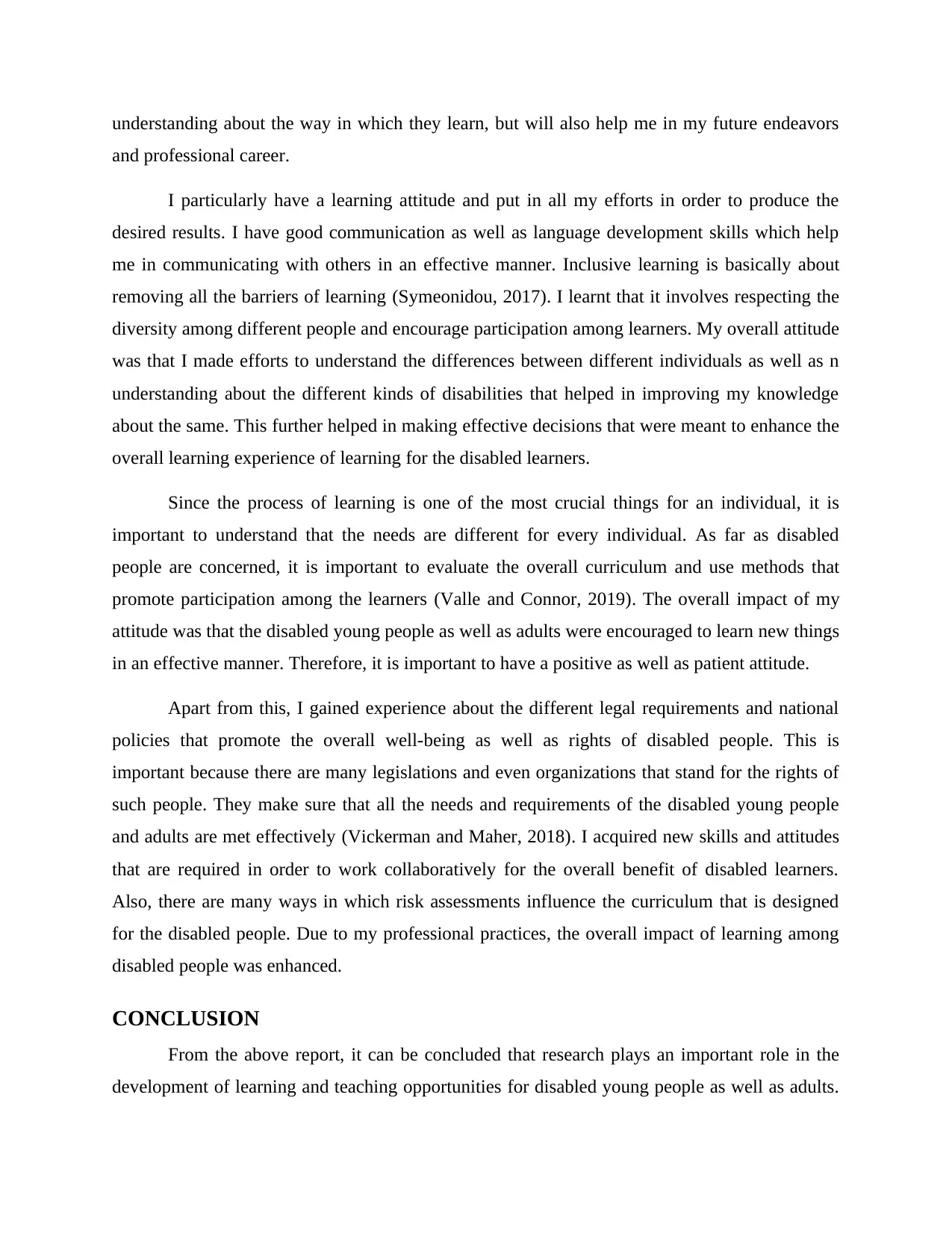
understanding about the way in which they learn, but will also help me in my future endeavors
and professional career.
I particularly have a learning attitude and put in all my efforts in order to produce the
desired results. I have good communication as well as language development skills which help
me in communicating with others in an effective manner. Inclusive learning is basically about
removing all the barriers of learning (Symeonidou, 2017). I learnt that it involves respecting the
diversity among different people and encourage participation among learners. My overall attitude
was that I made efforts to understand the differences between different individuals as well as n
understanding about the different kinds of disabilities that helped in improving my knowledge
about the same. This further helped in making effective decisions that were meant to enhance the
overall learning experience of learning for the disabled learners.
Since the process of learning is one of the most crucial things for an individual, it is
important to understand that the needs are different for every individual. As far as disabled
people are concerned, it is important to evaluate the overall curriculum and use methods that
promote participation among the learners (Valle and Connor, 2019). The overall impact of my
attitude was that the disabled young people as well as adults were encouraged to learn new things
in an effective manner. Therefore, it is important to have a positive as well as patient attitude.
Apart from this, I gained experience about the different legal requirements and national
policies that promote the overall well-being as well as rights of disabled people. This is
important because there are many legislations and even organizations that stand for the rights of
such people. They make sure that all the needs and requirements of the disabled young people
and adults are met effectively (Vickerman and Maher, 2018). I acquired new skills and attitudes
that are required in order to work collaboratively for the overall benefit of disabled learners.
Also, there are many ways in which risk assessments influence the curriculum that is designed
for the disabled people. Due to my professional practices, the overall impact of learning among
disabled people was enhanced.
CONCLUSION
From the above report, it can be concluded that research plays an important role in the
development of learning and teaching opportunities for disabled young people as well as adults.
and professional career.
I particularly have a learning attitude and put in all my efforts in order to produce the
desired results. I have good communication as well as language development skills which help
me in communicating with others in an effective manner. Inclusive learning is basically about
removing all the barriers of learning (Symeonidou, 2017). I learnt that it involves respecting the
diversity among different people and encourage participation among learners. My overall attitude
was that I made efforts to understand the differences between different individuals as well as n
understanding about the different kinds of disabilities that helped in improving my knowledge
about the same. This further helped in making effective decisions that were meant to enhance the
overall learning experience of learning for the disabled learners.
Since the process of learning is one of the most crucial things for an individual, it is
important to understand that the needs are different for every individual. As far as disabled
people are concerned, it is important to evaluate the overall curriculum and use methods that
promote participation among the learners (Valle and Connor, 2019). The overall impact of my
attitude was that the disabled young people as well as adults were encouraged to learn new things
in an effective manner. Therefore, it is important to have a positive as well as patient attitude.
Apart from this, I gained experience about the different legal requirements and national
policies that promote the overall well-being as well as rights of disabled people. This is
important because there are many legislations and even organizations that stand for the rights of
such people. They make sure that all the needs and requirements of the disabled young people
and adults are met effectively (Vickerman and Maher, 2018). I acquired new skills and attitudes
that are required in order to work collaboratively for the overall benefit of disabled learners.
Also, there are many ways in which risk assessments influence the curriculum that is designed
for the disabled people. Due to my professional practices, the overall impact of learning among
disabled people was enhanced.
CONCLUSION
From the above report, it can be concluded that research plays an important role in the
development of learning and teaching opportunities for disabled young people as well as adults.
⊘ This is a preview!⊘
Do you want full access?
Subscribe today to unlock all pages.

Trusted by 1+ million students worldwide
1 out of 15
Related Documents
Your All-in-One AI-Powered Toolkit for Academic Success.
+13062052269
info@desklib.com
Available 24*7 on WhatsApp / Email
![[object Object]](/_next/static/media/star-bottom.7253800d.svg)
Unlock your academic potential
Copyright © 2020–2026 A2Z Services. All Rights Reserved. Developed and managed by ZUCOL.





